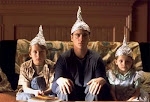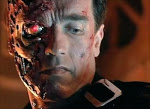 Any zombie movie has the potential to illustrate the ugliness of sin. Zombies are formerly pleasant, hard-working, mostly honest people who turn into animalistic, blood-thirsty goons. Apparently, anyone has the potential to be a zombie. Resident Evil, for example, explains zombification through latent brain waves that give the body enough energy to keep walking around, except only as senseless beasts. According to Resident Evil, people without restraints become monsters.
Any zombie movie has the potential to illustrate the ugliness of sin. Zombies are formerly pleasant, hard-working, mostly honest people who turn into animalistic, blood-thirsty goons. Apparently, anyone has the potential to be a zombie. Resident Evil, for example, explains zombification through latent brain waves that give the body enough energy to keep walking around, except only as senseless beasts. According to Resident Evil, people without restraints become monsters.
Zombie movies are ideal for scaring people because they portray an everyday world gone wrong. The people you thought you could trust are now clambering to tear out your larynx with their teeth.
I Am Legend does a particularly good job of demonstrating the spiritual implications of such a biological disaster. There are hints throughout the movie that keep God in forefront of the plot.
(Warning: Plot Spoilers Ahead)
Toward the beginning of I Am Legend, Will Smith defends God's reputation, saying that people imposed this disaster on themselves. Later on, after he endures a few years of loneliness and fear in a civilization devoid of civilized people, he struggles with this conviction.
Toward the end a young Cuban woman saves his life and claims that God guided her to find him just in time. She goes on about how, if we only listen, we will hear God's voice. Out of pent up frustration from his years of fruitless work, Smith shouts back to the woman that God doesn’t exist. Eventually, however, Smith thinks about the young woman’s words and comes around again. His newfound faith in God's divine plans inspires his so deeply that he sacrifices himself for the young woman and her son, as well as for everyone else who would benefit from his zombie remedy.
It is realistic that a man in Smith’s situation would struggle with his faith. However, the fact that his difficulties eventually solidify his faith makes the whole ordeal worthwhile.
A recurring theme is, “Where is God when bad things happen?” The answer from I Am Legend is, “We should not blame God for our mistakes.” There are posters in deserted city scenes that say “God still loves us, do we love Him?” Another poster portrays of Michelangelo’s Sistine Chapel, except where the man’s hand used to be, reaching back out to God, there is a gun pointing back at God.

























No comments:
Post a Comment